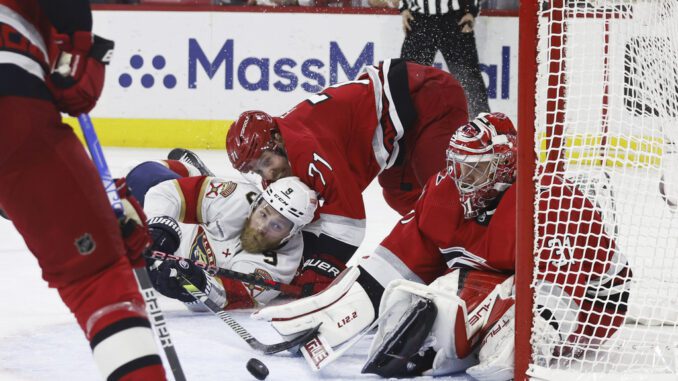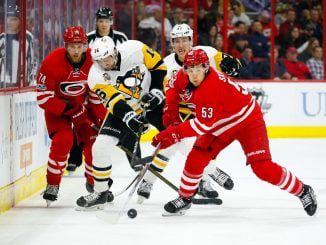
RALEIGH — Friday was a recovery day for everyone involved in Thursday’s epic four-overtime game — the players, coaches, staff, media and fans all needed a reboot after the nearly six-hour game won 3-2 by the Panthers.
It sets up a pivotal Game 2 on Saturday. A Hurricanes win would put the crushing loss in the rear-view mirror as the series shifts to Sunrise. A Florida win would give the upstart Panthers a stranglehold on the best-of-seven.
1. When Florida’s Matthew Tkachuk scored a goal with 12 seconds left in the fourth overtime of Game 1, he ended the sixth-longest game in NHL history.
The two longest games happened nearly a century ago — the longest in 1936, the second longest in 1933. But five of the top eight have been in the 2000s — and the results of those series don’t bode well for the Hurricanes.
The four games from the 2000s that have gone at least 70 minutes past regulation are:
- May 4, 2000: Philadelphia 2, Pittsburgh 1, Game 4, conference semifinal, 92:01, goal by Keith Primeau
- Aug. 11, 2020: Tampa Bay 3, Columbus 2, Game 1, first round, 90:27, goal by Brayden Point
- April 24, 2003: Anaheim 4, Dallas 3, Game 1, conference semifinal, 80:48, goal by Petr Sykora
- April 11, 2007: Vancouver 5, Dallas 4, Game 1, conference quarterfinal, 78:06, goal by Henrik Sedin
The winners of all four of those games went on to claim the series. There’s a glimmer of hope for the Hurricanes on Saturday, at least — three of those four games came in Game 1, and two of the losing teams bounced back to even the series in Game 2 despite eventually losing the series.
2. I wouldn’t be surprised to see a change to Carolina’s fourth line for Game 2. Inserting Mackenzie MacEachern might add a little more speed and physicality to counter Florida’s Ryan Lomberg.
While Derek Stepan is the likely player who would sit out if Hurricanes coach Rod Brind’Amour makes a switch, it’s worth looking at Jack Drury as well.
Drury joins Stepan and Jesse Puljujarvi as the only Hurricanes forwards without a goal this postseason, and he seemed to struggle to win board battles and clear pucks throughout Game 2.
3. Brind’Amour is keeping quiet on any changes he might make for Game 2. That included his starter in net.
“I think I’ll just leave it as suspenseful for the lineup tonight,” he said.
Much has been made of Andersen’s durability given his history of injuries. But it’s worth noting that his previous overtime loss was with Toronto in the 2020 qualifying round in the bubble against Columbus, a 4-3 Game 3 loss. The Leafs played the Blue Jackets the next day and won 4-3, with Andersen stopping 36 of 39 shots in an OT win.
He also lost a three-overtime Game 2 to Chicago in the 2015 Western Conference finals with the Ducks that evened that series. He bounced back to win Game 3 two days later, stopping all but one of the 28 shots he faced in a 2-1 win.
4. Special teams are a key component of every game and every series. Despite losing Game 1, the Hurricanes clearly had the edge with both their power play and penalty kill.
Carolina went 2-for-6 on the power play, registering 10 shots and scoring both their goals with the man advantage, and it limited Florida to just two shots on goal in three fruitless opportunities.
Panthers coach Paul Maurice admitted he’s had to adapt his team’s power play to face the Hurricanes’ relentless PK.
“The power play is going to be a challenge because that penalty kill’s a beast,” he said Saturday. “It’s not just good, right? They’re not hot. They’ve been good for five years.”
Maurice said he’s even taken to telling his team to treat the power play like it’s 5-on-5.
“So you have to have a change in philosophy on your power play in terms of how it’s gonna look,” he said. “We’re not bringing it in, setting it up and they’re just going to sit there and let it happen. It’s gonna be more of a chaos power play, more quick strikes to the net.”
While the Hurricanes’ power play did have success in Game 1, it did fail to score on a chance early in the fourth overtime. Carolina forward Seth Jarvis — who scored the first of Carolina’s two goals — said the exhaustion of the game wasn’t a factor in not converting in OT.
“I think you have the adrenaline rush and that’s what pushed a lot of people through that game, but you just need to be able to execute,” he said. “I think whenever you get a power play you get kind of a jolt of energy and excitement. … I think we did a good job executing, just not quite enough.”
5. I felt there were three keys to the Hurricanes winning this series: break even on the goaltending battle, have Sebastian Aho outduel Aleksander Barkov, and get an impact out of Teuvo Teravainen.
While Sergei Bobrovsky’s performance was unreal, I’m not sure one can fault Andersen in any way for the Game 1 loss. That’s a push.
The other two points are where things went a bit sideways. Barkov fought through his head-to-head matchup with Jordan Staal to factor in on both of Florida’s regulation goals. Aho did assist on Jarvis’ power play goal, but he was otherwise shut out.
Lastly, Teravainen got a rude reintroduction to the playoffs with 37:28 of ice time. He finished with three shot attempts, one on goal, and looked every bit the player who hadn’t played in a month. His legs and defensive game were there — he trailed only Aho in shorthanded ice time among forwards — but his hands often seemed a half step behind. That should improve as the series goes on.




